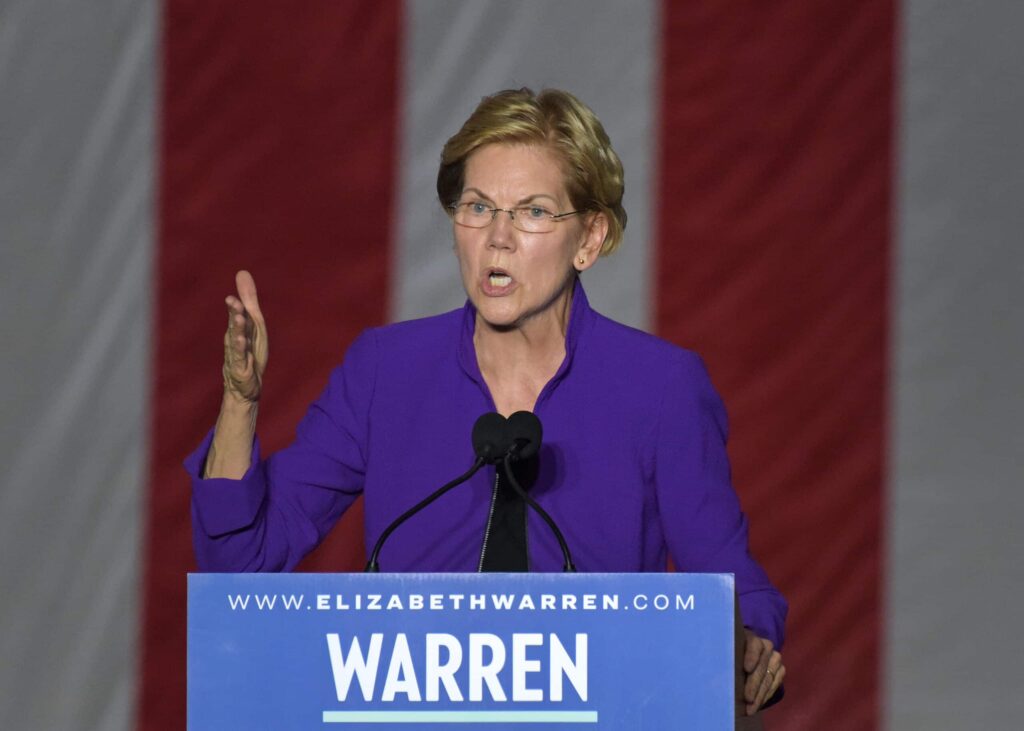
Unseating Sherrod Brown has given the leader of the “anti-crypto army” more power.
Elizabeth Warren is crypto’s most outspoken critic in the Senate
(Shutterstock)
Posted November 8, 2024 at 2:42 pm EST.
The crypto lobby successfully elected Bernie Moreno over incumbent Ohio Senator Sherrod Brown in Tuesday’s election, replacing a relatively lesser-known critic of the industry with a once-crypto entrepreneur.
However, in doing so, they gave the industry’s staunchest adversary in Congress, Massachusetts Senator Elizabeth Warren, even more power over crypto.
Warren will become the top Democrat on the Senate Banking Committee next session, Politico reports, an outcome that Unchained noted last month was likely. As Ranking Member, she will function as a de-facto spokesperson for the party’s Senate strategy on federal monetary policy, giving her a bigger platform from which to wage her war as General of what she calls the “Anti-Crypto Army.” The term refers to her recruitment of Senators on both sides of the aisle who prioritize national security concerns to advocate for stricter regulation of the cryptocurrency industry.
READ MORE: The One Senate Race That Could Give Elizabeth Warren More Power Over Crypto
Warren will not immediately have the same power Brown has had the past three years, however. After Democrats gained control of the Senate as a result of the 2021 Georgia special elections, Brown became committee chair, a role with the authority to set the legislative agenda. As Chair, Brown consistently refused to bring comprehensive crypto bills to a vote in the committee, falling in line with fellow Democrats who defined the industry as primarily a tool for crime and scams. If Democrats reclaim a majority of the Senate in the midterms, however, Warren is in the position to assume Chair.
It has become clear that Republicans would have had a majority in the Senate and thus control over the chairmanship of Senate committees without Ohio, however, raising the question of whether crypto elevated Warren into a more powerful role unnecessarily. Republicans have already flipped three battleground states, giving the party control of at least 52 Senate seats, and could potentially win several more seats that have not yet been called. Ohio was considered one of the critical swing seats before either party predicted a red sweep, but hindsight is 20-20.
READ MORE: How Congressional Committee Leadership Could Shake Out for Crypto This Election
Banking Committee Leadership
Because Republicans have decisive control of the Senate, South Carolina Republican Senator Tim Scott will likely become chair. Scott has been outspoken in support of the industry, pushing for light-touch regulations favored by blockchain businesses. He has several times spoken on panels with Wyoming Republican Cynthia Lummis, a blockchain legislation heavyweight who has introduced several crypto-related bills including one which would establish a strategic bitcoin reserve, and has consistently voted in favor of market structure and stablecoin legislation.
Agriculture Committee Leadership
Republican’s decisive win in the Senate also makes clear the leadership of two other committees. The Senate Agriculture Committee, which manages CFTC oversight, will almost certainly be led by Arkansas Republican Senator John Boozman, who is a politician the community can expect to get deeply involved in the details of writing legislation, and who has a reputation of working with Democrats after his collaboration with retiring Michigan Democratic Senator Debbie Stabenow.
Minnesota Senator Amy Klobuchar, whose current perspectives on crypto aren’t very clear to lobbyists who spoke with Unchained, will likely be Ranking Member of the Senate Agriculture Committee. Klobuchar is deeply concerned with anti-trust law, and even wrote a book on the history of how these laws have “taken on monopoly power” — something that could align her with Elizabeth Warren’s portion of the Democratic party and make her more negative on crypto legislation. That said, Klobuchar hasn’t been particularly outspoken against crypto in recent years, either.
READ MORE: It’s Not Just the Presidency. Congressional Races Matter a Lot for Crypto
Finance Committee Leadership
With the Senate Finance Committee, which will play a significant role in writing a tax bill next year, crypto is in relatively good hands due to the presence of relatively pro-crypto politicians on both sides of the aisle. Idaho Republican Senator Mike Crapo is expected to be chair and has been historically supportive of the industry, though not as outspoken as the crypto lobby would like. Tax bills always involve trade-offs, and politician’s priorities, rather than just their binary support or opposition, can become critical if there’s a battle over which special interests should come first.
However, Oregon Democrat Ron Wyden will likely be Ranking Member, helping to elevate crypto tax issues. Wyden is one of the Democratic Party’s most outspoken supporters of crypto, having built his political brand years ago as a privacy hawk whose legislation on net neutrality helped broaden adoption of the internet.
Powered by WPeMatico



